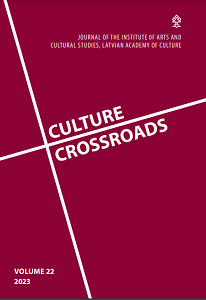EXPLORING THE CONCEPT OF FREEDOM IN A STRICTLY NOTATED SCORE THROUGH THE AUTOETHNOGRAPHIC RESEARCH METHOD: CASE STUDY – KARLHEINZ STOCKHAUSEN’S KLAVIERSTÜCK I
EXPLORING THE CONCEPT OF FREEDOM IN A STRICTLY NOTATED SCORE THROUGH THE AUTOETHNOGRAPHIC RESEARCH METHOD: CASE STUDY – KARLHEINZ STOCKHAUSEN’S KLAVIERSTÜCK I
Author(s): Helga KarenSubject(s): Fine Arts / Performing Arts, Music, Sociology of Art
Published by: Latvijas Kultūras akadēmija
Keywords: autoethnographic research; Stockhausen; interpretation; freedom; strictly notated score;
Summary/Abstract: Autoethnography is a research method that focuses on the researcher’s personal experiences and, through the analysis of experiences, can contribute to a fuller understanding of a phenomenon on a wider cultural level. In music, personal experience, whilst unique, can be a relatable and reliable source for the community. I am researching the individual – myself – to show my perspectives and share my experiences with others. In this article, I aim to show how the autoethnographic research method, applied to the rather technical research question of how to understand and practice a strictly notated score, can lead to an attempt to understand the meaning of freedom in musical interpretation. The article presents my own research project, with the methodology and analytical process of the data, and describes one example of the practical work conducted in my research with the piano pieces of Karlheinz Stockhausen. I aim to examine the understanding of freedom in musical interpretation and discuss why precise notation that at first might not give an impression of free interpretation possibilities can in fact be an interesting way of finding oneself and one’s personal approach.
Journal: Culture Crossroads
- Issue Year: 22/2023
- Issue No: 1
- Page Range: 117-128
- Page Count: 12
- Language: English

